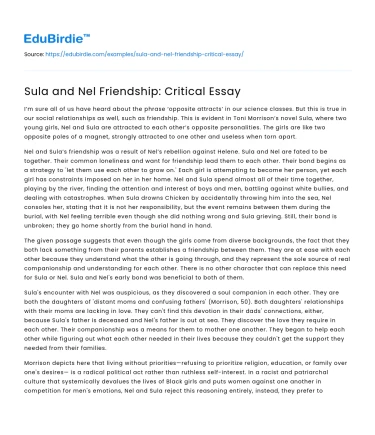I’m sure all of us have heard about the phrase ‘opposite attracts’ in our science classes. But this is true in our social relationships as well, such as friendship. This is evident in Toni Morrison’s novel Sula, where two young girls, Nel and Sula are attracted to each other’s opposite personalities. The girls are like two opposite poles of a magnet, strongly attracted to one other and useless when torn apart.
Nel and Sula’s friendship was a result of Nel’s rebellion against Helene. Sula and Nel are fated to be together. Their common loneliness and want for friendship lead them to each other. Their bond begins as a strategy to 'let them use each other to grow on.' Each girl is attempting to become her person, yet each girl has constraints imposed on her in her home. Nel and Sula spend almost all of their time together, playing by the river, finding the attention and interest of boys and men, battling against white bullies, and dealing with catastrophes. When Sula drowns Chicken by accidentally throwing him into the sea, Nel consoles her, stating that it is not her responsibility, but the event remains between them during the burial, with Nel feeling terrible even though she did nothing wrong and Sula grieving. Still, their bond is unbroken; they go home shortly from the burial hand in hand.
Save your time!
We can take care of your essay
- Proper editing and formatting
- Free revision, title page, and bibliography
- Flexible prices and money-back guarantee
The given passage suggests that even though the girls come from diverse backgrounds, the fact that they both lack something from their parents establishes a friendship between them. They are at ease with each other because they understand what the other is going through, and they represent the sole source of real companionship and understanding for each other. There is no other character that can replace this need for Sula or Nel. Sula and Nel's early bond was beneficial to both of them.
Sula's encounter with Nel was auspicious, as they discovered a soul companion in each other. They are both the daughters of 'distant moms and confusing fathers' (Morrison, 50). Both daughters' relationships with their moms are lacking in love. They can't find this devotion in their dads' connections, either, because Sula's father is deceased and Nel's father is out at sea. They discover the love they require in each other. Their companionship was a means for them to mother one another. They began to help each other while figuring out what each other needed in their lives because they couldn't get the support they needed from their families.
Morrison depicts here that living without priorities—refusing to prioritize religion, education, or family over one's desires— is a radical political act rather than ruthless self-interest. In a racist and patriarchal culture that systemically devalues the lives of Black girls and puts women against one another in competition for men's emotions, Nel and Sula reject this reasoning entirely, instead, they prefer to explore the forbidden force of female friendship.






 Stuck on your essay?
Stuck on your essay?

